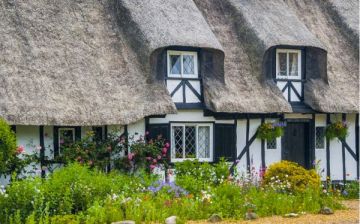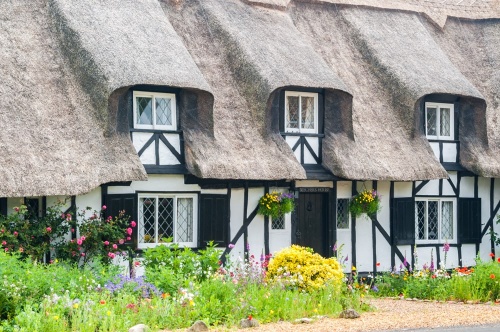
Hemingford Abbots is a pretty village on the south bank of the River Great Ouse, facing Houghton, on the north bank, across a broad, green expanse of water meadows. It lies immediately west of the neighbouring, and much larger, village of Hemingford Grey, with which it shares a primary school.
Both villages were named for an unknown Saxon landowner named Hemma, and the name roughly translates as 'the ford of Hemma's people.' Much of the village is part of a conservation zone, meaning that it retains its historical ambience and its many period buildings. It was recorded as Emingeforde in the Domesday Book of 1086.
The village lies along the route of a Roman road linking Godmanchester and Cambridge and a Roman sarcophagus was uncovered near the line of the present A1307.
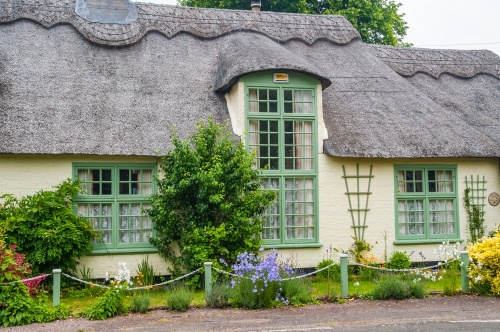
History
The two Hemingford villages were part of the same estate in the Saxon period, when parts of both were owned by Ramsey Abbey. The Hemingford Grey estate was split off from Hemingford Abbots in the 9th century, but remained in the hands of Ramsey Abbey until the abbey was suppressed by Henry VIII in 1539.
After the Dissolution of the Monasteries, the Hemingford Abbots estate was granted to Oliver Leader and the manor was promptly sold on the Fotheringhay College in Northamptonshire. The college was, in turn, suppressed by the Crown and the estate was granted to Sir Thomas Seymour, 1st Baron Seymour of Sudeley. Seymour was executed for treason in 1549 and the estates were granted to the Marchioness of Northampton.
In 1625 the manor was granted to the Ramsey family, and from them it passed to the Page family. The Pages were Royalists during the Civil War, but the residents of Huntingdonshire were largely Parliamentarians, which resulted in local disputes and lawsuits trying to get the vicar of St Margaret's Church, a member of the Page family, removed from his post.
The manor was split at some point during the 17th century, only to be reunited under the Mitchell family in the 19th century.
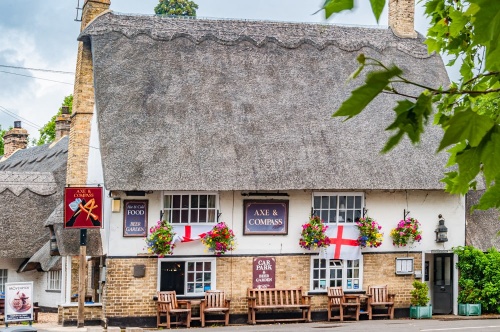
St Margaret's Church
The Domesday Book recorded a church and priest at Hemingford Abbots, almost a century before Hemingford Grey gained its own church. Nothing remains of that Norman building. The earliest surviving part of the current church dates to around 1300. The oak roof of the nave was installed in the 15th century and is decorated with carved figures of angels.
There is a 14th-century octagonal font, and in the vestry is a Romano-British sarcophagus, discovered in 1889.
There is very good 18th-century stained glass, with memorial windows to members of the Dickens and Hildesley families installed around 1740. The east window of the north aisle boasts some older medieval glass fragments.
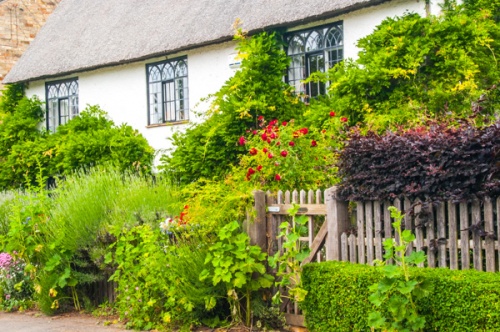
Historic Buildings
The village is blessed with a number of attractive thatched buildings, some of them dating to the late medieval or Tudor periods. One of those thatched buildings is the Axe and Compass pub, housed in a historic 15th-century building.
There are 44 listed buildings in the village, including one Grade I listed building (the parish church of St Margaret), and two Grade II* listed buildings (the Old Rectory on Common Lane and Hemingford Park Hall, an early Victorian mansion built in 1842 by Decimus Burton for Rev J Linton).
The Old Rectory, begun in the 18th century and remodelled in 1813 in Strawberry Hill Gothic style, stands in a Grade II listed garden stretching down to the river. The garden incorporates a large pond which may date to the period of Ramsey Abbey's ownership, when it could have been used as a holding pond for fish.
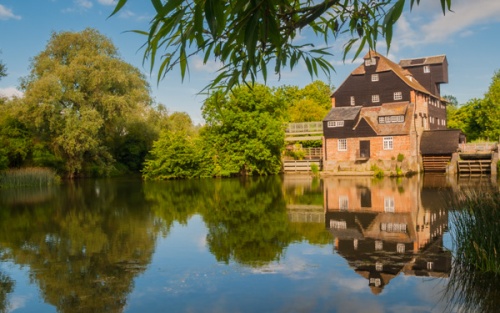
Unlike neighbouring Hemingford Grey, which has expanded south of the river as it developed, Hemingford Abbots stretches in a lengthwise fashion on both sides of Common Lane, which turns into High Street. As you travel east along High Street it is hards to tell precisely where Hemingford Abbots ends and Hemingford Grey begins.
The village shares an annual regatta with Hemingford Grey. The regatta takes place in July each year and is limited to local residents, who race using ordinary pleasure craft such as rowboats and canoes.
Houghton Mill
If you take a signposted footpath from the north end of Meadow Lane, you cross Hemingford Meadow, a wide grassland island. At the northern end of the island, you reach a lock leading to the National Trust's historic Houghton Mill, a restored 17th-century water mill and the last surviving mill on the Great Ouse. The present five-storey mill stands on the site of a medieval mill owned by Ramsey Abbey.
Getting There
Hemingford Abbots is reached by a minor road off the A1307 immediately east of Godmanchester. You can also reach the village easily by a number of footpaths along the River Great Ouse from Godmanchester, Houghton, and Hemingford Grey. We can highly recommend the walk from Houghton Mill, across the water meadows to Hemingford Abbots, then along the south bank of the river to St Ives.
About Hemingford Abbots, Cambridgeshire
Address: A1307,
Hemingford Abbots,
Cambridgeshire,
England
Attraction Type: Village
Location: Off the A1307 immediately east of Godmanchester, or by footpath from Houghton Mill on the north bank of the river.
Location map
OS: TL281711
Photo Credit: David Ross and Britain Express
POPULAR POSTS
HERITAGE
 We've 'tagged' this attraction information to help you find related historic attractions and learn more about major time periods mentioned.
We've 'tagged' this attraction information to help you find related historic attractions and learn more about major time periods mentioned.
Find other attractions tagged with:
NEARBY HISTORIC ATTRACTIONS
Heritage Rated from 1- 5 (low to exceptional) on historic interest
Houghton Mill - 0.6 miles (Historic Building) ![]()
Hemingford Grey Manor - 0.7 miles (Historic Building) ![]()
Hemingford Grey, St James Church - 0.7 miles (Historic Church) ![]()
Norris Museum - 1.9 miles (Museum) ![]()
Huntingdon Castle - 2.5 miles (Castle) ![]()
Huntingdon, All Saints Church - 2.8 miles (Historic Church) ![]()
Offord Darcy, St Peter's Church - 5 miles (Historic Church) ![]()
Over, St Mary's Church - 5.7 miles (Historic Church) ![]()
Nearest Holiday Cottages to Hemingford Abbots, Cambridgeshire:
More self catering near Hemingford Abbots, Cambridgeshire



